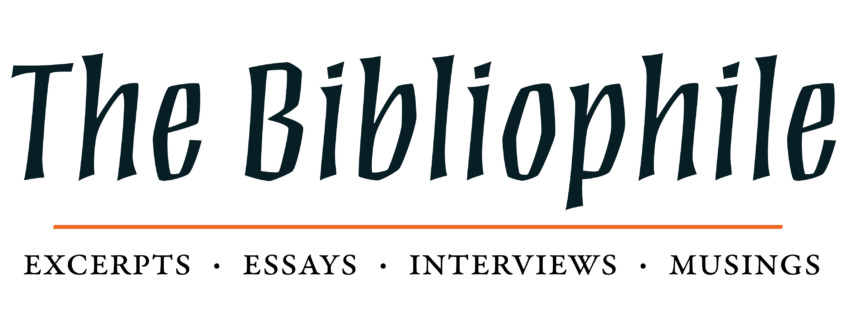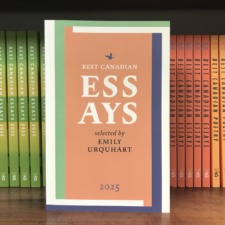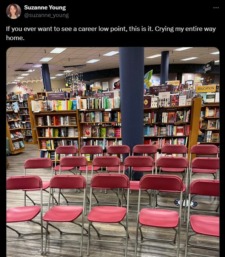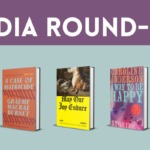The Bibliophile: Confessions of a Literary Schlub
Want to get new excerpts, musings, and more from The Bibliophile right away? Sign up for our weekly online newsletter here!
***
In addition to two other fine books, Mark Kingwell’s Question Authority and Graeme Macrae Burnet’s A Case of Matricide—more on both soon enough—this month we also launch our yearly installment of the Best Canadian anthologies: Essays, Poetry, Stories. This is our eighth year publishing Best Canadian Stories, which we took over from Oberon when they closed shop; and it’s our sixth publishing Best Canadian Poetry and Best Canadian Essays, which had previously been published by the now-shuttered Tightrope Books. I’ve been a long admirer of the Best American anthologies—I have the better part of two-thirds of a complete run of Best American Stories, going back now more than a century, at home—and I’d hoped that having all three anthologies under one roof might provide opportunities to market and grow the readership for these Canadian versions. As with almost everything in publishing, that’s easier said than done. Publishing is hard; publishing anthologies is, somehow, much harder. This is a shame, because every year there are unexpected riches to be found in each, work you’re unlikely to have found, especially in this age of algorithmic overload, otherwise.
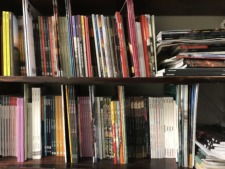
Photo: Behind the scenes of Best Canadian, a glimpse at our shelves of Canadian publications from which the editors select works for each anthology.
Of the three anthologies, the one that seems to have the hardest time finding readers is Best Canadian Essays. This, too, is a shame: it’s become my favourite. There are essays from previously published installments that I still find myself thinking about: from 2020, edited by Sarmishta Subramanian, Michelle Orange’s “How it Feels to Be Free,” which has even more relevance five days out from another panic-inducing presidential election; Christina Sharpe’s “Beauty Is a Method,” which served as my introduction to this writer’s brilliance; Michael LaPointe’s “The Unbearable Smugness of Walking,” which I still think he should have agreed to expand into a Field Note. From 2021, edited by Bruce Whiteman: Mark Kingwell’s meditation on grief, “The Ashes.” From 2023, edited by Mireille Silcoff: Kathy Page’s “That Other Place,” about acquiring an unwanted passport into the land of the unwell, and Sarmishta Subramanian’s “Going the Distance,” on the way that Covid remade friendships. From 2024, edited by Marcello Di Cintio: Gabrielle Drolet’s “In Defence of Garlic in a Jar,” which has made my relationship to food prep so much easier (no small thing!). Any of these essays would have been worth the proverbial price of purchase; for free, then, you get the baker’s dozen or so that comes with them.
“In tackling the role of editor for the Best Canadian Essays series,” 2025 editor Emily Urquhart writes in her introduction, “I read work in literary and journalism magazines, in newspapers, online journals and zines, and in publications that I couldn’t begin to classify. How many essays? Maybe hundreds . . . I tracked my progress through sticky notes and marginalia, and by the precarious piles of magazines stacked on my office floor, which shot up like skyscrapers in a fast-developing city. This vast reading was an act of divination . . . [from which] after nearly a year of reading, a cluster of singular works came forth.” This is exactly the opposite of the algorithmic processes we all publicly decry and to which we are privately addicted: the editorial process is personal, considered, considerate, and unsystematic. But the resulting gathering is as wide-ranging and finely focused as one could hope for, covering in unexpected ways the range of human, and humane, concerns.
“An essay might rant,” Emily concluded, “hold strong opinions, or be a call to action. It can be futile, or constructive, or both. It can be personal and distant all at once. It can entertain, instruct, or educate. It can resonate. It can resolve, or it can fade into the ether. It can laugh. It can weep. It can howl with indignity. Essays . . . are changeable and chameleon-like: they adapt with the times, and they reinvent themselves.” And they can help us reinvent ourselves, too.
The writing life is woven through Emily’s selection, including essays by Sadiqa de Meijer on losing her notebook, Rebecca Kempe on a poetry reading she seems incapable of escaping, and this painfully funny essay, by Tom Rachman, on the perils (there are so few pleasures) of literary promotion, “Confessions of a Literary Schlub,” which we dedicate to all of our writers currently or soon to be on the road—Caroline Adderson, Lisa Alward, Richard Kelly Kemick, Catherine Leroux, Alex Pugsley, and Jón Kalman Stefánsson, just this week alone!—in this last manic rush of the festival circuit season. Have courage! At least the stingrays always show!
Dan Wells,
Publisher
***
“Confessions of a Literary Schlub”
by Tom Rachman
As my flight descended over the turquoise Caribbean, I asked myself, Who’d go to the Cayman Islands and attend a literary event of mine? I soon learned the answer: nobody. Just empty chairs and an awkward bookseller. “Maybe you could swim with stingrays tomorrow?” she suggested. “They always turn up.”
Promoting a book can derange you. After years of quiet toil and noisy typing, you clutch a published book, and step forth to meet the public, eight billion humans who, mystifyingly, seem not to know that your new novel just came out.
Occasionally, someone treats you like the important writer you long to be (but probably aren’t). They rave about your prose and frown attentively when you speak. It’s an adrenaline shot to your ego. Then, you’re at a signing table, the pile of hardcovers all unsold, and everyone has gone. You’re just another needy nobody, your ego mashed underfoot.
Now and then, a literary novelist is swept to fame. But most are swept by the polar wind of indifference. To avert oblivion, authors today attempt to twist themselves into hucksters, the spokesmodels for their books, sales rep of their inner lives.
I’d like to blame tech. I try to blame it for everything. When the internet bulldozed the traditional press, it squashed book coverage too. But the internet flung up alternatives, from literary websites to BookTok to public readings on Zoom.
Finally, novelists didn’t need the gatekeepers. They could shout for attention themselves. On the downside, they had to shout for attention themselves.
Publishers and agents— rarely certain why one decent book soars when a thousand more go plop—pressured authors to become more accessible, not merely slouching around festivals and bookshops, but thrusting themselves forward for inspection on Goodreads and Twitter and making themselves reachable via direct message. The writerly myth altered.
Previously, biographies and gossip imagined The Novelist as a tormented character, pungent from debauchery, infidelity, booze. Now, the writers who prevailed seemed assertively nice: the endearing quirks, the correct politics.
Being beastly never made anyone talented at writing. Nor does being kind to cats. My point is: the skill set for literature is not necessarily the skill set for promoting it.
Imagine Dostoevsky, nagged to update his Facebook page. Or Emily Dickinson at a poetry slam, posting on Instagram. Or Kafka addressing his fans on YouTube: “Hey, guys! Brutal wakeup today: I open my eyes, and I’m, like, an insect—what is up with that?! Check out my new story, #Metamorphosis. Hit ‘like,’ and subscribe below!”
Consider the case of Suzanne Young, author of a young-adult horror novel, who turned up for her reading in Phoenix, and found that she outnumbered the audience. Young tweeted a photo of the deserted store, with the caption, “If you ever want to see a career low point, this is it. Crying my entire way home.”
She didn’t sob for long. Her tweet went viral, and she ended up on NBC Nightly News, living a plot twist worthy of feel-good fiction: because nobody turned up, she had a hit.
What is the moral of her story? That the internet can save us? Or that bookstore readings are a waste, and you’re better off hyping yourself online?
For today’s author, the trail of shamelessness begins before the novel is published—perhaps before it’s written. Developing an online fanbase inhibits your writing, but your career may depend upon it. (Before her sorrowful event, Young already had more than twelve thousand Twitter followers, who helped circulate her post, ultimately seen by 7.9 million people.)
Once you’ve produced a manuscript, your self-abasement picks up, as you beg blurbs from any noted writer you’ve chanced to meet and failed to alienate. This means published ex-classmates from the creative writing MFA; or prominent authors who taught you there; or the bestselling novelist you importuned at a literary festival.
Superficially, the blurb is a recommendation to readers. But it’s also a flex, showing that a novel’s author is connected, high-status, has cool friends.
Every blurb request is inappropriate. You’re demanding twenty hours or more from a busy professional, all to serve your interests, and with questionable impact. Moreover, you’re asking an author to mislead their readers, given that most blurbs are plainly dishonest: there simply isn’t that much genuine gushing.
Next, you must badger your followers and family to preorder your novel, as advanced sales cue the publisher to take it seriously and promote yours rather than the flood of other books released at the same time. To attract coverage, you need a narrative behind the narrative—that your fiction is actually non-fiction in disguise, inspired by your messy divorce, your messy kids, your drug bust, your life in the burbs, your PTSD, your OCD, your impotence, your incontinence, your pet marmot Ernesto.
What you mustn’t say is that you just made up the story, that it came purely from imagination. Fellini, I once heard, falsified personal anecdotes to publicize his movies. I’ve been tempted to try this, to spin yarns and present myself as charismatic. But I can’t bring myself to lie. I remain a schlub making cups of tea in my kitchen.
You also must write for free. Now that the media has fragmented into many outlets of varied intent, you cannot hope that a mighty publication will crown your book. Even the cover of the New York Times Book Review has far less effect than it had. Once, it meant instant bestseller. Today, with everyone reading on phones, there is no “cover” in the same way.
So, you churn out self-publicizing content in disguise, everywhere from upstart literary blogs to old-media websites—free contributions like “The 7 Best Books on the Subject I Just Wrote About.” This bewilders me, that you’re supposed to promote your book by exhorting people to buy other books. You must pray they’ll notice your mini-bio and click the Amazon link.
Needless to say, you schlep to any event that’ll have you. The organizers are delightful; they revive your faith in contemporary literature and restore your longing for a place in it. Then, you’re looking out from a lectern at seven people, three of whom are personal friends. You wonder if any of this makes sense.
Book events expose a fundamental flaw in promoting fiction: novelists tend to be mumblers with bad haircuts who can’t bring their writing to life before a crowd and are inarticulate when answering questions about the craft. Some are performers; some are insightful; some, inspiring. More are the dinner guest nobody notices, but who has thoughts, and gathers them, composes them, types them in private, revises and revises—and only then, finds the words.
One of my first bookstore readings was at Politics & Prose in Washington, DC. Beforehand, the organizers stashed me in a sideroom alongside a staffer on break, whose calm contrasted with my terror. In minutes, I’d need to declaim about literature. I had no right. I was an imposter.
After the event, my sister rushed over, assuring me I hadn’t humiliated myself. “You didn’t seem nervous at all,” she said.
“Tranquilizers,” I confided. “I took many tranquilizers.” According to a recent survey conducted by the Bookseller magazine, the majority of debut authors say book publication damaged their mental health. At least one respondent ended up on meds.
But writing careers have always been marked more by failure than glory. And blurbs, public readings, mass indifference—all that preceded the internet era.
Is any of this truly new?
When it comes to contemporary literature, you hear debates about identity and appropriation, about awards and autofiction. But what matters is the competition: those words and pictures and videos heating the device in your pocket, which vibrates so impatiently, goading you to check its stories.
While the internet is the most powerful marketing tool that writers have ever had, the internet is also devastating to an art that requires close concentration.
Once, brainy types read contemporary novels for amusement, to ponder what it meant to be human, to shock themselves at what others did privately, to join the intelligentsia, to march into the debate. This role is rarely taken by a novel today.
A subculture of ultraliterary types does still rally around the latest darlings of fiction. A bigger constituency buys the novels selected for TV book clubs or by prize juries. Most years, a screen-adapted literary work joins the bestseller list. But beneath those few titles are stacks and stacks of disappointment.
The study of literature dwindles too, as with the rest of the humanities. According to a report in The Times of London, one university had two hundred English-literature undergrads a decade ago; now, it’s down to thirty.
When I meet bookish types with young-adult offspring, many speak of how their kids devoured fiction when little, but have since abandoned it. What those middle-aged bookish types are ashamed to add is that they themselves—with extensive culture and extensive bookshelves—scarcely read fiction anymore.
One culture critic told me that he still reviews novels because that way he is forced to read them. Authors have made similar admissions to me.
Will Lloyd, a journalist at the political and literary magazine the New Statesman, noticed that he’d read plenty of books lately—and none was a novel. So, he spent a week quizzing the literary types he knew, asking whether they were reading fiction, if they discussed it with friends, if they sought it out for social insights. Among forty people, only two said yes.
I feared that I was an imposter in writing. I’ve come to wonder if all literary novelists are imposters now, barging into the far edge of the culture, holding up reams of pages, saying, I wrote something—look at it!
How presumptuous: engaging in make-believe, asking strangers to admire it. Those strangers too have something to say, and nowadays can, commenting, filming, liking, downvoting.
What’s odd about being a novelist today is that the position retains a shimmer of prestige with only a glimmer of audience.
Or maybe I’m wrong. Maybe it’s just my writing that is shrivelling away. Maybe I’m projecting my eclipse onto the field.
I wouldn’t fight that charge. I’m tired of fighting for attention, imploring strangers to care about what I cared about, pleading for a hearing of my voice in an art that seems quieter and quieter, that is missing the point somehow.
A New York book editor told me that publishing had always been this way: a few megahits support all those below. Even writers at the top are rarely satisfied. Philip Roth, who had success after success, died bitter that he hadn’t won the Nobel Prize, the editor remarked, wondering just how much would be enough to quench authors.
A few weeks ago, I visited a smattering of London bookshops at the request of my British publisher. Sheepishly, I approached staff, mentioning that I was supposed to sign my new novel. They hunted down a few copies. I always feel absurd autographing books.
But it’s thrilling too, if you don’t look down: that someone was crazy enough years ago to fly me to the Cayman Islands for a reading.
I’ve been an imposter, unsure what I was doing here, frazzled by a caterwauling, distracted, outraged world, my thoughts firing, hesitating to say them—so I put them onto paper, fighting with sentences, removing commas only to replace them, judging myself a failure, hating that I minded, despairing at my irrelevance, writing to cure myself, wanting to say something that’d make others listen, trying, trying, mostly failing.
A writer.
“Confessions of a Literary Schlub” by Tom Rachman first appeared in the Globe and Mail.
***
20 Stores for 20 Years: The Bookmark
It’s Biblioasis’ 20th anniversary this year, and we wanted to celebrate 20 independent bookstores who have helped us make it this far! This week we’re featuring The Bookmark, who has locations in Fredericton, Charlottetown, and Halifax. Mike Hamm from the Bookmark Halifax stepped up to tell us about his favourite Biblioasis book, How to Build a Boat by Elaine Feeney, and our publisher Dan Wells wanted to share one of the reasons why we love the Bookmark (and Mike!). Read on to learn more about Mike’s favourite book and our first “20 stores for 20 years” store.
When Dan published Biblioasis’ first book in 2004, Salvatore Ala’s Straight Razor and Other Poems, one of the first sales calls he made was to Mike Hamm at The Bookmark Halifax: “I know now how lucky I was to start with such a generous bookseller. Mike and The Bookmark were willing to support us from the get-go, at a time when most, reasonably, couldn’t be bothered; and they have continued to do so for twenty years, whether it be for local writers like Alexander MacLeod (Light Lifting), Kris Bertin (Bad Things Happen), or for the hundreds of other books we’ve published.”
And here’s why Mike chose How to Build a Boat as his favorite Biblioasis book: “The excitement surrounding Elaine Feeney’s writing intensified with the release of How to Build a Boat. When Biblioasis published this magnificent novel in the leadup to the holiday season, I had found my perfect book to recommend. Its poignancy, grace and insight into the delicate nature of human relationships captivated me and many others. Thank you, Biblioasis, for not only bringing us amazing talent from all across Canada but representing the best authors from around the globe.”
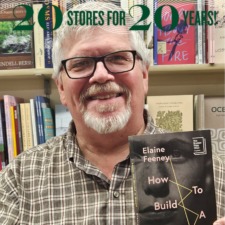
Photo: Bookmark Halifax manager Mike Hamm poses with his Biblioasis pick, How to Build a Boat by Elaine Feeney.
***
In good publicity news:
- Kevin Lambert (May Our Joy Endure) was profiled in the Globe and Mail: “[A] literary wunderkind.”
- May Our Joy Endure was reviewed in the Montreal Review of Books: “Lambert uses a large cast of characters to depict society’s complexities. His gaze is oceanic, homing in on individuals and zooming out to the systems within which they operate.”
- Anne Hawk shared insights from The Pages of the Sea on The Conversation podcast. Anne also spoke about her book on the Bookspo podcast.
- Mark Kingwell (Question Authority) was interviewed on the Canadaland podcast.
- A Case of Matricide by Graeme Macrae Burnet was featured in the Los Angeles Times: “Smart, quirky and fun.”
- Podolo, one of this year’s Seth’s Christmas Ghost Stories, was read in full on the Christmas Past podcast.

